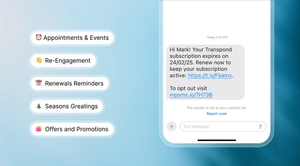So, you're a small business owner trying to figure out social media marketing and how to turn it into a channel that drives revenue.
You've probably heard about Instagram stars and viral TikTok videos promising quick success.
But let's be honest: managing your social media feels more like juggling than a simple, straightforward task.
Don't worry, though.
This guide will help you understand the basics and learn from the best:
What is social media marketing?

Social media marketing is all about using social platforms to promote your brand, products, or services. It uses platforms like Facebook, Instagram, Twitter, and LinkedIn to reach your audience.
Social media marketing vs traditional marketing
Traditional marketing is often more about one-way communication or creating awareness. You put out an ad on a platform, and your audience sees it.
Social media marketing, on the other hand, is all about engagement. You post content, your audience interacts with it, and you can respond back.
What social media platforms are there?
While there are dozens of small and niche social media platforms, but you might want to focus on the list below at first:
- YouTube is a powerhouse for a wide range of video content, whether it’s tutorials, vlogs, or product reviews.
- Facebook is mostly for building a community and sharing updates.
- Instagram is perfect for visual content like photos and videos.
- Pinterest is fantastic for visual discovery and inspiration, especially in areas like fashion, food, and home decor.
- TikTok has taken the world by storm with its short, engaging videos, perfect for creative and viral marketing.
- LinkedIn? It’s the one for B2B marketing and professional networking.
- Snapchat appeals to a younger audience with its fun, ephemeral content.
- X, formerly known as Twitter, is the go-to for real-time updates and conversations.
- Reddit offers a unique space for niche communities and discussions, so it's great for targeting specific interests.
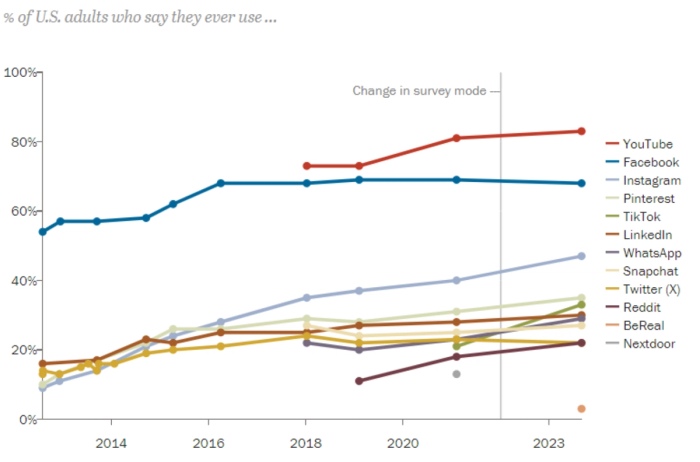
Each platform has its own unique strengths, and using them the right way will benefit your business in multiple different ways.
You may also like:
Viral social media posts that you can steal for yourself
40+ small business resources: books, podcasts & more
The small business guide to using AI for digital marketing
Why small businesses should have a social media marketing strategy
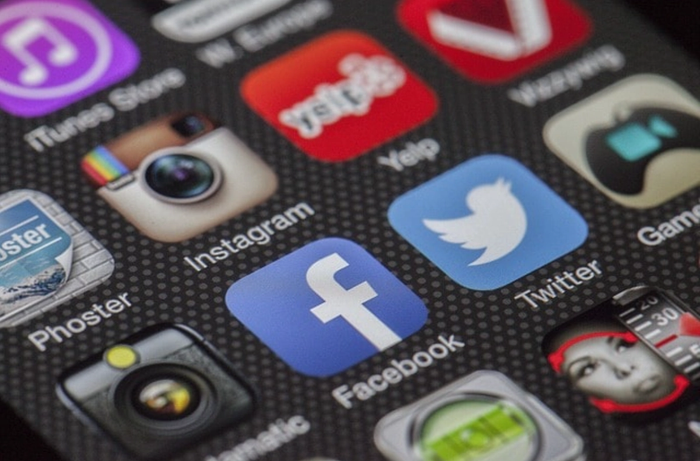
Cost-effectiveness
Traditional advertising can be pricey. But with a solid social media marketing strategy, the entry costs are much lower.
You can start with a minimal budget and still reach a big audience.
Plus, social media marketing tools often have free options to get you started. You can create engaging social media posts that reach your target audience without spending a fortune.
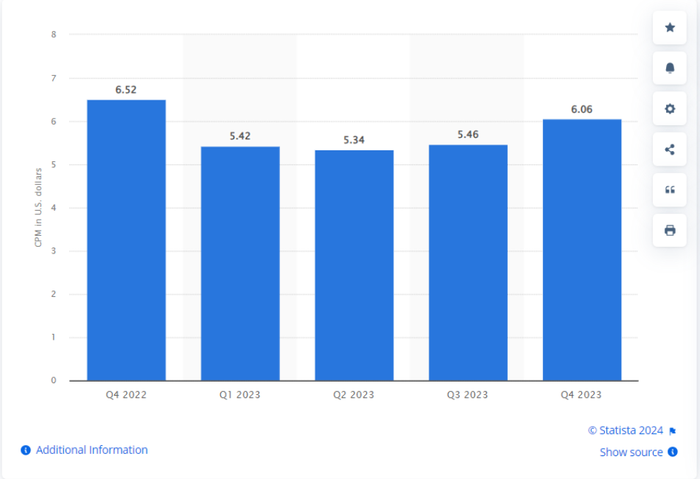
Expanded visibility and brand awareness
Almost everybody is on social media these days...and that provides ready-made audiences.
These channels help you reach a wider audience than other methods.
So by consistently using a range of social media platforms, you can build a recognizable brand.
Your presence makes it easier for people to find and remember you. The more people see your brand, the more familiar they become with it. And familiarity builds trust.
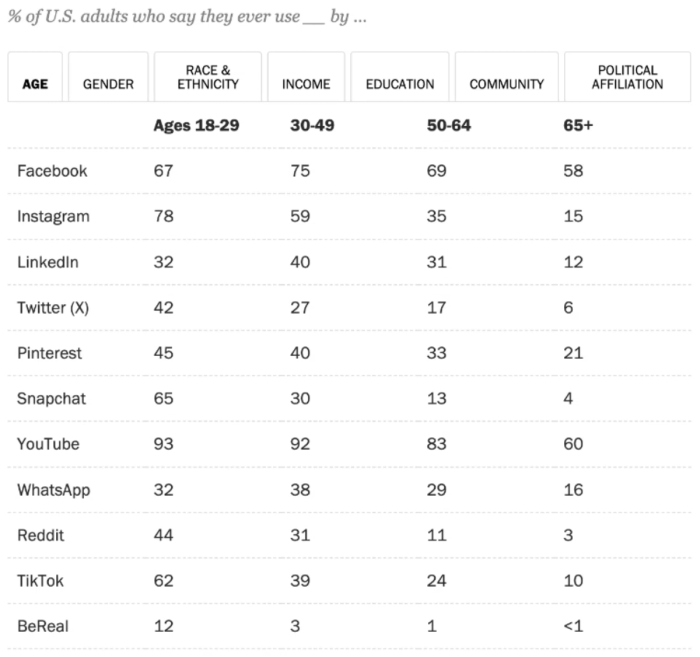
Improved customer engagement
Now, let’s look at customer engagement. Social media allows for direct interaction with your customers.
In 2024, people spend around 2 hours and 38 minutes scrolling through various social media platforms - daily.
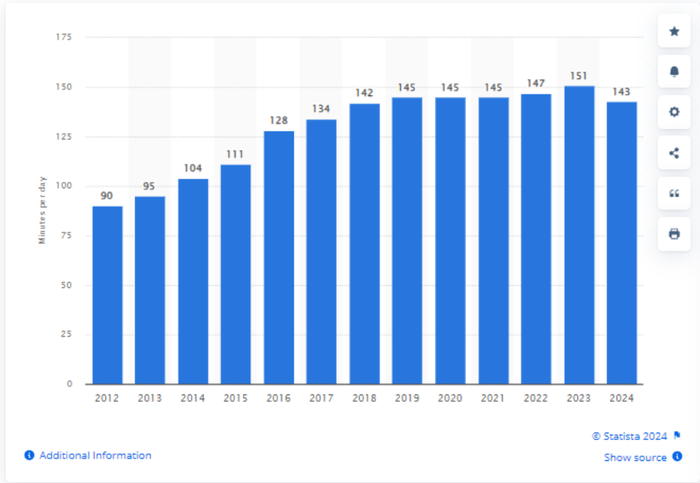
During this time, you can respond to comments, answer questions, and even resolve issues in real-time. This direct interaction helps build customer loyalty and trust.
When customers feel heard and valued, they’re more likely to stick around. Plus, engagement can give you valuable feedback on what your customers like or don’t like about your products or services.
Access to valuable insights
One of the biggest advantages of social media marketing is access to insights.
Social media platforms offer analytics tools that help you understand your customers' preferences and behaviors.
You can track which social media posts perform best, what times your audience is most active, and more.
This helps you make data-driven decisions, which are important if you want to drive continuous improvements. Understanding social media trends and using social media management tools can optimize your strategy.
Let's look at some of the qualitative and quantitative data your small business could get:
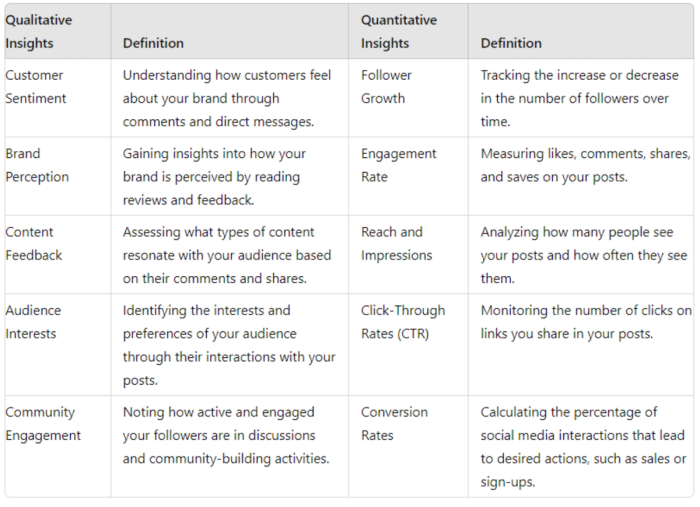
Adaptability and current trends
Lastly, social media is constantly evolving.
This means that by staying close to social media trends, you can adjust your strategy as needed.
Whether it’s new features on a social media platform or changing user behaviors, being adaptable keeps you ahead of the curve.
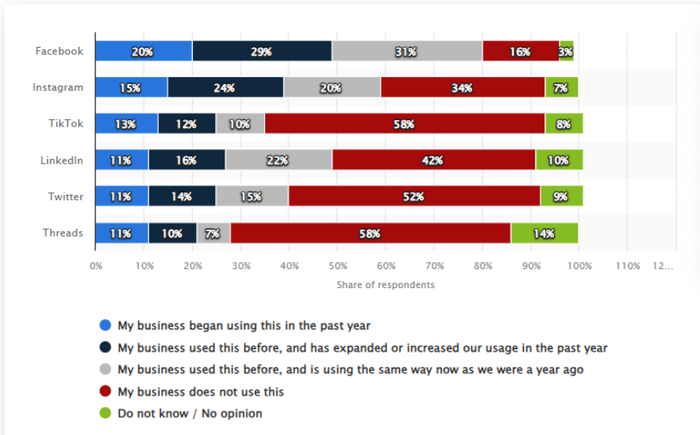
Keeping a social media calendar helps you stay organized and consistent, so you’re always engaging with your audience in the right way.
A social media marketing strategy is a must-have for small businesses. It’s cost-effective, boosts visibility, improves engagement, provides valuable insights, and helps you stay current. Embracing these social channels will set you up for success. Your main investment to make it work is time.
You may also like:
25 local advertising ideas to grow your small business
20 tips to grow your business - a strategic guide
Why staying small is the new big thing in business
How to get started with small business social media marketing?
Now that you know how beneficial social media marketing can be, let’s go through the process of getting started, step by step:

#1 Creating a social media strategy
Start by setting clear goals and objectives.
What do you want to achieve? Identify your target audience. Who are they? Choose the relevant platforms where your audience is most active.
This sets the foundation for your future activity.
Some examples for what you can do:
- Set a SMART goal to grow your Instagram followers by 20% in the next three months.
- Identify your target audience by creating buyer personas that detail their interests and online behavior.
- It could be that you need to focus on Instagram and LinkedIn because your research shows your target audience spends most time on these platforms.
#2 Content creation and management
You’ll need a mix of content types: posts, stories, videos, ads.
Plan your content with a calendar.
This way, your content will be consistent and your audience will stay engaged for longer.
Regular, engaging content is key.
Examples of what you can do:
- Create a content calendar using tools like Kontentino or Google Sheets to schedule posts for the next month.
- Mix up your content with 40% posts, 30% stories, 20% videos, and 10% ads.
- Use Canva to design eye-catching graphics and videos that align with your brand’s aesthetic.
#3 Interaction with followers
Respond to comments and messages promptly.
Building a community around your brand is how you create loyalty. Also, handle feedback and criticism with grace.
It’s an opportunity to show your responsiveness and care for your customers.
Examples of what you can do:
- Set a goal to respond to all comments and messages within 24 hours.
- Host a weekly live Q&A session on Facebook to engage directly with your audience.
- Create a plan for handling negative feedback, focusing on resolving issues and showing appreciation for customer input.
#4 Analytics and performance tracking
Monitor key metrics like engagement rate, reach, and conversion rate.
Tools like Google Analytics and platform-specific insights are invaluable here.
They help you understand what’s working and where to improve.
Examples of what you can do:
- Use Google Analytics to track referral traffic from social media to your website.
- Monitor your Instagram engagement rate weekly using Instagram Insights.
- Set up monthly reports to analyze the performance of your social media campaigns and adjust strategies accordingly.
#5 Setting up social media accounts
Choose the right platforms for your business.
Create and optimize your accounts. Make sure your profiles reflect your brand and are easily recognizable.
A well-optimized profile attracts more followers.
Examples of what you can do:
- Optimize your Facebook profile with a clear profile picture, cover photo, and complete business information.
- Use keywords in your LinkedIn company profile to improve search visibility.
- Add a consistent bio and contact information across all platforms to ensure brand recognition.
#6 Developing a content strategy
A well-developed content strategy cannot go unnoticed.
Research and understand your audience. Plan your content types and posting schedule. Utilize tools for content creation and scheduling, like Kontentino and Canva.
This makes managing your social media presence much easier.
Examples of what you can do:
- Conduct a survey to understand the types of content your audience enjoys the most.
- Plan a mix of educational, entertaining, and promotional content to keep your feed varied and engaging.
- Use Kontentino to schedule posts ahead of time and collaborate with your team on content ideas.
#7 Growing your audience
Growing your audience takes effort.
Take advantage of hashtags and trends to increase your reach. Running promotions and giveaways can attract new followers.
Collaborating with influencers and other businesses can expand your audience even further.
Examples of what you can do:
- Create a weekly list of trending hashtags relevant to your industry and use them in your posts.
- Run a giveaway on Instagram in which participants have to follow your account and tag friends for a chance to win something.
- Partner with an influencer in your niche to reach their followers with a special promotion or collaboration post.
#8 Paid advertising
There are various social media ad types to explore. Setting up and managing ad campaigns requires some learning but is worth it. Don't forget about proper budgeting and targeting to make the ads effective.
Paid ads will increase your visibility and reach.
Examples of what you can do:
- Start a Facebook ad campaign targeting local users to promote a new product launch.
- Use Instagram’s promoted posts feature to expand the reach of your best-performing organic posts.
- Allocate a monthly budget for LinkedIn ads aimed at B2B professionals in your industry to generate leads.
You may also like:
A guide to small business marketing
20+ universal email templates for small business owners
How to run a successful marketing event
Examples of effective social media marketing campaigns
Now, let's get inspired and look at how companies are using social media marketing to their favor:
#1 The Dollar Shave Club Launch

The Dollar Shave Club became famous overnight with their hilarious and straightforward launch video on YouTube.
They spent minimal money but got maximum exposure. The key? A clear, funny message that resonated with their target audience.
The video went viral, leading to millions of views and an influx of customers.
What made it successful:
- The video was funny and spoke directly to the audience's frustrations with expensive razors.
- It clearly explained the product’s benefits.
- The content was shareable, which helped it spread quickly.
#2 Glossier's community-driven growth
Glossier, a beauty brand, builds its success by listening to its community.
They use Instagram to gather feedback and involve their audience in product development.
Their strategy of user-generated content and real customer testimonials creates a strong, loyal following.
What makes it successful:
- They actively involve their audience in the brand’s journey.
- Customers feel valued and become brand advocates.
- Real testimonials build trust.
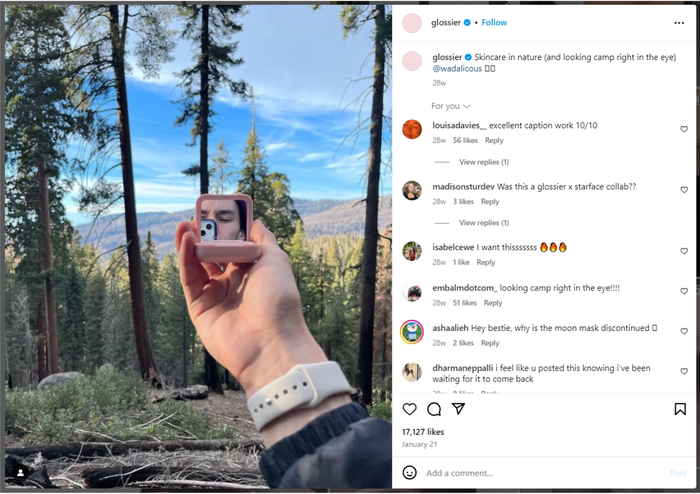


#3 Airbnb's "We Are Here" campaign
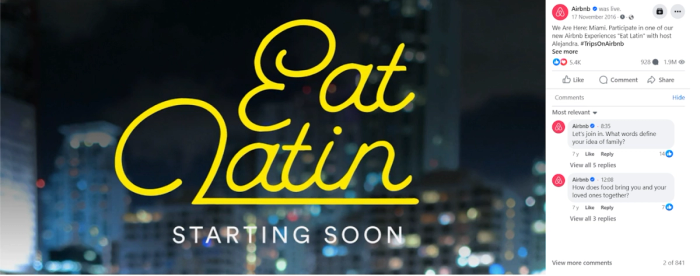
Airbnb launched the "We Are Here" campaign back in 2016 to showcase unique experiences hosted by locals.
They used Facebook and Instagram to stream live experiences, giving potential customers a taste of what they could book.
This campaign highlighted the authentic, local experiences that Airbnb offers.
What made it successful:
- Live streaming added excitement and immediacy.
- It highlighted unique aspects of their service.
- Real-time interaction with viewers was something unique.
#4 Wendy’s roasts on X
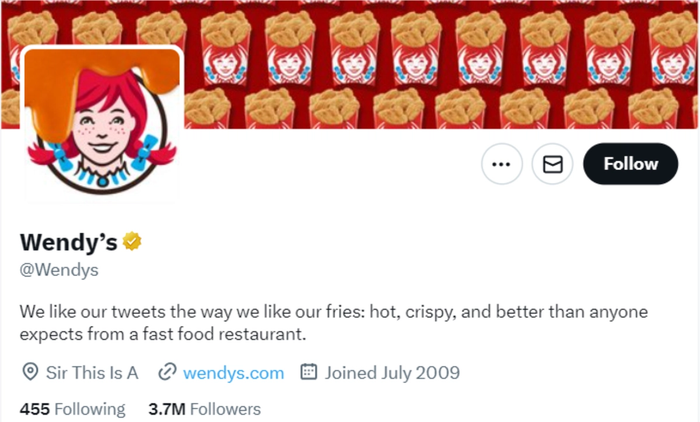
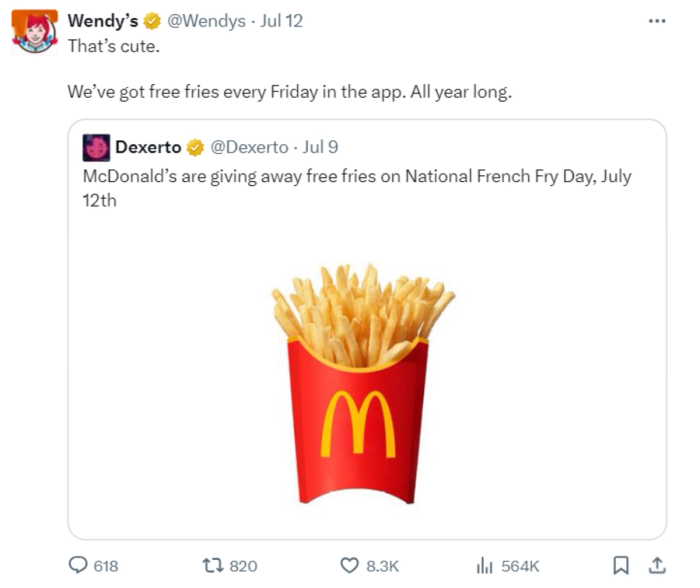
Wendy’s has become known for their witty and humorous X account.
They engage with their audience by roasting competitors and responding cleverly to customer tweets.
This strategy has increased their visibility and brand personality.
What makes it successful:
- Clever and funny responses keep followers entertained.
- Regular interaction with followers keeps the brand's online visibility fresh.
- A unique and memorable brand personality lets Wendy's embed their brand in customers' minds.
Bonus: small business social media statistics you need to know
We encourage you not to think like these companies:
- 66% of small businesses think it's difficult to find the right message to share on social media.
- 43% of small businesses don't measure their social media ROI.
- 17% of small businesses don't have a social media presence.
- 59% of small businesses believe social media is nice to have but not essential.
Instead, think more like these companies:
- Nearly all small and medium-sized businesses (SMBs) utilize social media to promote their products and services.
- Additionally, about 70% of these businesses use social media to interact with customers and improve their overall experience.
- Over 40% of SMBs experience customer growth, attributing part of this increase to social media.
Social media trends for 2025 and beyond
Short-form video content
Have you watched a short video today? Maybe it was a TikTok, an Instagram Reel, or a YouTube Short. These quick, engaging clips grab attention instantly, making them a must-have in any social media strategy. In fact, 89% of businesses use video as a marketing tool, with short-form videos delivering the highest ROI.
How can you use them for your strategy? For example, if you run a small handmade candle business, you could showcase the process of pouring wax into molds or share quick tutorials on how to mix scents at home:
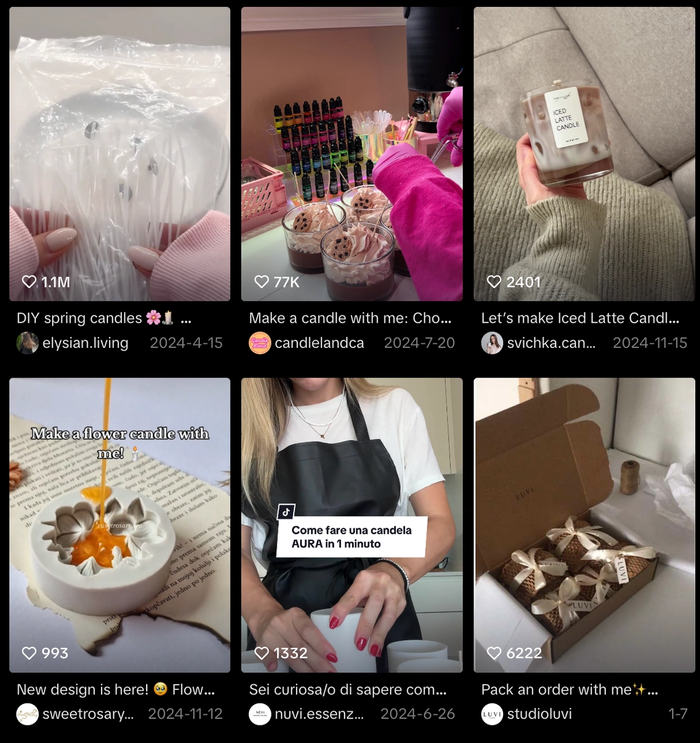
https://www.tiktok.com/search?q=handmade%20candle&t=1741336040766
Behind-the-scenes glimpses, customer reactions, or time-lapse videos of a candle burning beautifully can make your brand feel even more engaging.
Social commerce
Social commerce lets customers shop without ever leaving their favorite platforms. The entire buying journey – discovery, decision, and checkout – happens in one place. For example, a small boutique can set up an Instagram Shop, allowing customers to tap ‘Buy Now’ as soon as they spot something they like on their profile. If you sell dresses, you can showcase them in a post, tag the products, and let customers complete their purchase instantly – with no extra clicks or redirects needed.
Live streaming
Live streaming lets you connect with your audience instantly and in a fun way. It's available for free on many social platforms, so you can easily:
You can use it to:
- Run a live Q&A – Answer customer questions in real time, whether about your products, services, or industry trends.
- Host a product demo – Show how your product works and demonstrate its value while engaging with potential buyers.
- Create a live sale event – Offer exclusive discounts for viewers and encourage immediate purchases through limited-time deals.
You don’t even need automation to make it work. For example, if you run a live stream in a Facebook group, viewers can comment on what they’d like to buy or learn more about, and after the session, you can follow up with details or personalized offers.
Micro-influencer collaborations
Micro-influencers (up to 50K followers) have highly engaged audiences and are a budget-friendly way for small businesses to reach niche markets. Unlike big-name influencers, they’re often easier to work and drive stronger engagement. On Instagram, micro-influencers average an engagement rate of 3.86%, while mega-influencers average 1.21%.
How to find the right one:
- Follower count – Ideally between 10K–50K, but don’t write off smaller accounts just yet! Even those with 1000 followers can be incredibly valuable if their audience is highly engaged. Sometimes, a smaller influencer with a tight-knit community can drive more action than a larger one with passive followers.
- Engagement rate – 3-5% or higher shows an active audience, meaning their followers actively like, comment, and interact with their content.
- Niche fit – Their content should align with your business. For example, a handmade candle brand should collaborate with home decor or lifestyle influencers rather than general fashion bloggers.
You've figured social media marketing out... What's next?
Today, you need more than just social media to make your small business succeed.
Customer relationship management (CRM) tools are key to organizing and optimizing your interactions with customers.
Take Capsule CRM, for example.
It’s great for small businesses that want to streamline operations and grow.
With features like contact management, sales tracking, and easy integration with other tools, Capsule CRM helps you close more deals and keep your customers happy.
Additionally, you can use a solution like Transpond, Capsule’s marketing tool to manage your social media, which will keep you ahead of the game.
Try our starter CRM with basic features for up to 2 users and 250 contacts for free today.
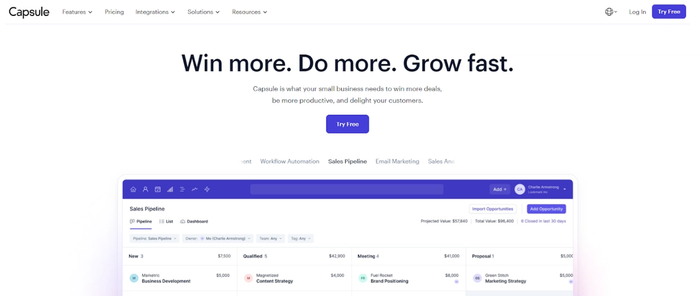
Conclusion
In the long run, social media advertising offers incredible benefits for small businesses.
It’s cost-effective, increases visibility, boosts engagement, and provides valuable insights.
As a result of building relationships and engaging with your community, you’re setting your business up for long-term success.
Remember, every small step counts. Start today, stay consistent, and watch your business grow.




